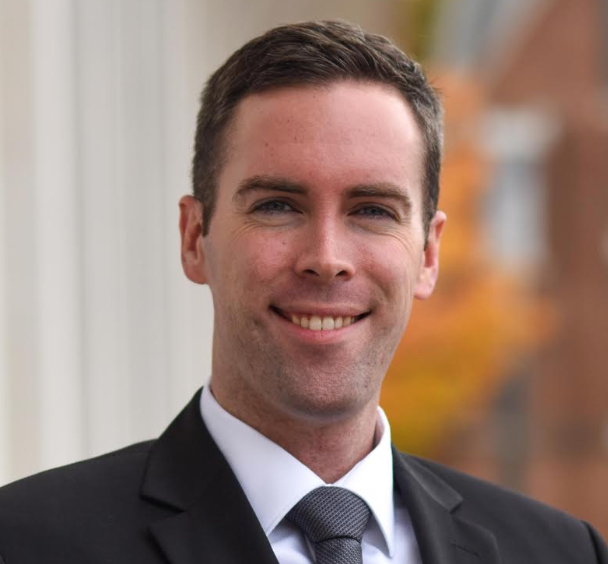Summary of Kurt Volker’s Deposition Testimony
Published by The Lawfare Institute
in Cooperation With

Editor’s note: This is one of many summaries of depositions released by House impeachment investigators. The others are available here.
Former U.S. Special Representative for Ukraine Negotiations Kurt Volker testified before Congress in the ongoing impeachment inquiry on Oct. 3. Below is a summary of his testimony, as compiled from the transcript of his deposition and text messages provided by Volker.
***
Former U.S. Special Representative for Ukraine Negotiations Kurt Volker was the first witness to be interviewed as part of the impeachment inquiry. Volker stated that he had resigned from his position because he felt he could no longer be effective with the inquiry ongoing and with his name in the media. He also said that he wanted to be able to provide testimony to Congress, though he repeatedly denied that any government official instructed him not to cooperate with the inquiry.
Volker emphasized that he acted solely to advance U.S. foreign policy goals with respect to Ukraine. He identified a problem with regard to this goal—namely, that the president was receiving a negative narrative about Ukraine from his personal lawyer, Rudy Giuliani. Volker said that this narrative was causing the president to be less willing to support the new Ukrainian leadership.
Volker denied knowing about or participating in any effort to urge Ukraine to investigate former Vice President Joe Biden or his son. He said that he cautioned the Ukrainians several times to distinguish between highlighting their own efforts to fight corruption in Ukraine and doing anything that could be seen as impacting U.S. elections.
Volker stated that he did not listen in on the phone call between President Trump and Ukraine President Volodymyr Zelensky. He said he became aware of the president’s interest in investigations concerning the Bidens when the transcript was released. He said that he was aware that Burisma was associated with Hunter Biden but that he was never aware that President Trump had an interest in Burisma. However, he did hear a desire for Ukraine to open an investigation into Burisma from Rudy Giuliani. Volker added that he knew that the president was concerned with the possibility of Ukrainian interference in the 2016 election, though Volker did not recall the president asking for investigations into that alleged interference.
After the Ukrainian election in May, Volker urged President Trump to support President Zelensky, but Trump expressed a negative view of Ukraine. Volker said that Trump referenced Giuliani’s negative assessments of the Ukrainians, including that Giuliani had told Trump that the Ukrainians had tried to “take down” Trump in the 2016 election. When pressed on this conversation, Volker said that he thought Giuliani’s comments were in reference to accusations made by former Ukrainian Prosecutor General Yuriy Lutsenko that Ukrainians had sought to influence the 2016 election by providing derogatory information about President Trump and Paul Manafort to the Hillary Clinton campaign. Volker said that he believed Lutsenko was acting in a self-serving manner and that the allegations were not credible. Volker also stated that Giuliani believed the allegations and that, in Volker’s opinion, Trump did as well. He pointed to these negative views to explain the difficulties in scheduling a meeting between Trump and Zelensky.
The questioning then turned to the draft of a statement by President Zelensky. Andrey Yermak, a close adviser to Zelensky, sent Volker a proposed draft of the statement. Volker said that he discussed the statement with U.S. Ambassador to the European Union Gordon Sondland and Rudy Giuliani in the hopes that it would convince Giuliani to speak more positively about Ukraine to the president. Giuliani, however, declared that without specific references to investigations of Burisma and the 2016 election, he did not find the statement “convincing.”
Volker said that, at the time, he understood Giuliani to mean that unless Zelensky explicitly mentioned the investigations, the statement would not convey that the new Ukrainian leadership was any different from past administrations. In response to Giuliani’s comments, Volker wrote a draft of the statement that included the references, but when he discussed the draft with Yermak, he suggested that they should be excluded. Yermak agreed that references were not a good idea. Volker said that he then advised Yermak to avoid saying anything that would look like it would play into domestic U.S. politics.
Volker acknowledged that he set up a meeting between Yermak and Giuliani; he asserted that he did so because he believed Giuliani had been in touch with Lutsenko and was receiving—and passing along to the president—bad information that reinforced a negative view of Ukraine.
The committee then asked Volker about the suspension of aid to Ukraine. Volker stated that the suspension struck him, at the time, as unusual. Because he considered the assistance to be extremely important, he looked into the suspension, but no one gave him an explanation. According to Volker, the Ukrainians did not learn of the suspension until after their call with President Trump.
The testimony then turned to the content of the whistleblower’s complaint. Volker described the complaint as a “fairly accurate characterization,” though he claimed that the whistleblower got some facts wrong. Volker explained that the “damage” to which the complaint refers was the negative narrative the president was receiving about Ukraine. Volker also stated that he helped the Ukrainian leadership “navigate” the process of convincing the president that they were committed to fighting corruption. Volker disputed the complaint’s characterization that he was dispatched to Ukraine following the president’s phone call—he claims the trip was preplanned and that he heard of the call “en route” to Ukraine. He described receiving a readout of the call both from a State Department staffer and from the Ukrainians; neither readout, according to Volker, included a reference to Burisma or the 2016 election.
While Volker was in Ukraine, he met with Yermak. In response to questioning, Volker acknowledged that he communicated to Yermak that he should explain to Zelensky the need to convince President Trump that he would investigate the alleged 2016 election interference; after that, Trump would be willing to schedule a date for Zelensky to visit the White House.
In response to a possible argument that Trump meant to reference an investigation into Burisma instead of Biden on his phone call with Zelensky, Volker countered, saying he believed Trump did in fact mean Biden. Responding to Trump’s request to investigate Biden, Zelensky said he would investigate the company (in this case, Burisma). In Volker’s view, Zelensky’s response focusing on Burisma was a way to avoid saying he would investigate the Bidens and interfere in U.S. domestic politics.
Moving to the submitted text messages, Volker mentioned that Trump wanted a public statement from Zelensky that the Ukrainians were committed to reform and to investigating the past before hosting a visit at the White House. The Ukrainians were concerned about coming out of the blue and making such a statement. Rather, it would make sense to make a broader statement about rebooting U.S.-Ukraine relations when there was a specific date for their visit.
Volker then explained a phone call with Sondland and Giuliani where the latter wanted the Ukrainian statement to specifically mention investigations into Burisma and the 2016 elections. However, when this request was relayed, Yermak asked whether the U.S. Justice Department had formally requested such an investigation. After later learning that Justice did not send an official request for an investigation, Volker told Yermak that it would make sense not to mention investigation of Burisma and the 2016 elections in any sort of statement. Ultimately, the Ukrainians did not end up making any statement. Volker summarized that it was the Ukrainians’ caution, along with his advice, that led Zelensky not to make a statement.
Volker stated that it would be a legitimate aim for Ukraine to investigate Burisma if there was something improper. However, he said that, in retrospect, when you look at the Trump and Zelensky transcript in conjunction with what Giuliani has said on television, it is clear that Giuliani was pushing for investigations into Burisma and the 2016 elections to serve Trump’s political interest. Nevertheless, Volker testified that he does not think that Trump was asking for Zelensky to manufacture dirt on the Bidens. He noted that he didn’t believe Vice President Biden would have been corrupted over the appointment of his son to Burisma. However, it is possible that some Ukrainians may have sought to buy influence.
Volker later said that when he heard of the military assistance freeze to Ukraine, he immediately argued that it should be reversed. This sentiment was shared by much of the interagency, except the Office of Management and Budget, which had put the hold on for a review. Later, he would advise the Ukrainian defense minister to talk to Defense Secretary Mark Esper about the issue. Volker said that with 20/20 hindsight, it is possible that the Ukrainians may have perceived the hold on security assistance as related to Giuliani’s efforts to have them initiate investigations into Burisma and the 2016 elections.
While Pompeo knew that Volker connected Yermak with Giuliani, Giuliani was not acting on behalf of the State Department, Volker testified. Volker went on to recount his initial outreach to Giuliani when Giuliani stated he would go to Ukraine to investigate the allegations leveled by Lutsenko. Volker offered to brief Giuliani and mentioned that Lutsenko was not credible. Nevertheless, Giuliani had a lot of negative narratives about Ukraine, including that there might be enemies of the United States around Zelensky. These views might have been influencing Trump’s thinking. In a past oval office meeting, Volker recalled Trump stating that Ukraine was a corrupt country and even mentioned that the Ukrainians had tried to take him down.
Volker later mentioned that the Ukrainians wanted to have a meeting and see the transcript of the July 25 phone call prior to its release. They wished to prepare their own messaging; additionally, as a matter of respect, it would then look like they agreed to its release. After the Ukrainians’ request, however, the only consultation with the administration came from Pompeo to Zelensky. Pompeo stated that they they had no choice but to release the transcript and could not consult with the Ukrainians any further. Volker later mentioned that the Ukrainians felt that their interests were being subordinated to U.S. domestic political activity.
During his questioning by Republican Rep. Mark Meadows, Volker acknowledged that there was never a quid pro quo that was communicated to him at any time. In other wrap-up questions, he again commented that the former prosecutor general of Ukraine, Lutsenko, was not credible and “was making things up … to create a self-serving narrative to make himself look valuable to the United States, in the hopes that we would urge the new President not to remove him from his job.”






